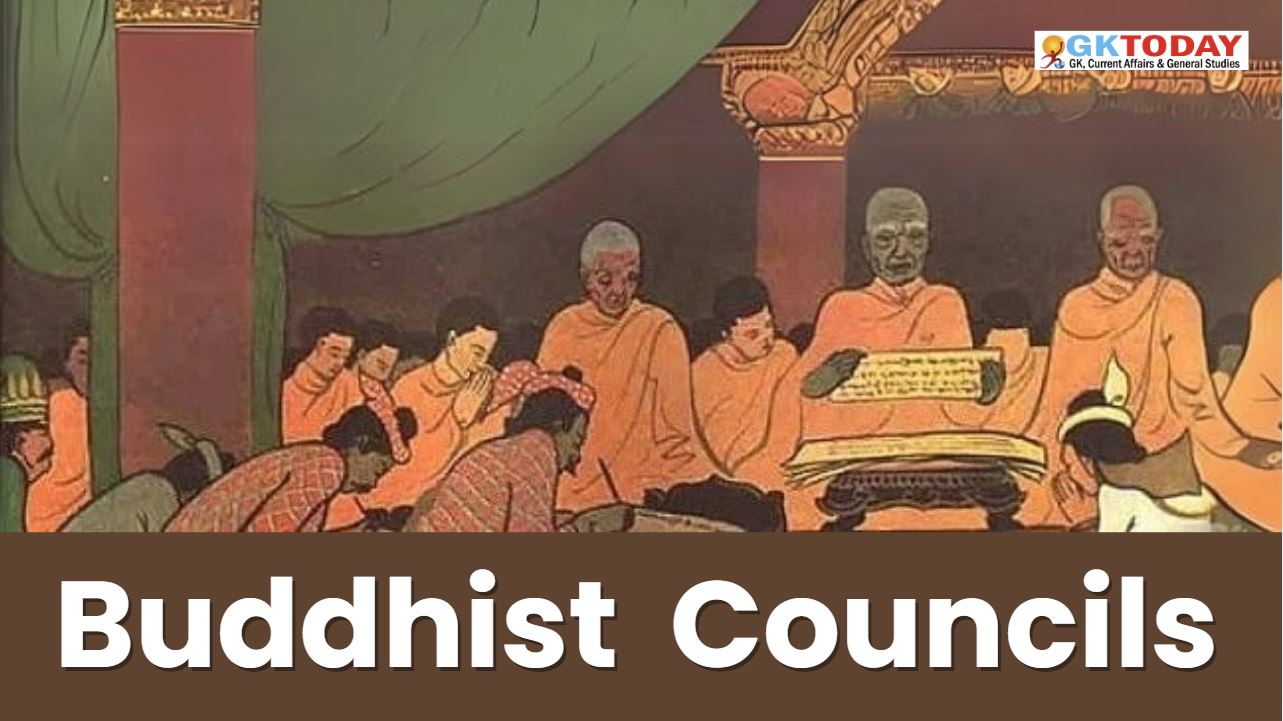Buddhist Councils
Six Buddhist councils have been convened. Here is a short description:
First Buddhist Council: 400 BC
- Held soon after the mahaparinirvana of the Buddha, around 400 BC under the patronage of king Ajatshatru with the monk Mahakasyapa presiding, at Rajgriha, in the Sattapani Cave.
- The idea was to preserve Buddha’s teachings (Sutta) and rules for disciples (Vinaya). Ananda, one of the great disciples of Buddha recited Suttas and Upali, another disciple recited Vinaya. Abhidhamma Pitaka was also included.
Second Buddhist Council : 383 BC
- It was held in 383 BC. This idea of this council was to settle a dispute on Vinaya Pitaka, the code of discipline. The dispute was on 10 Points such as storing salt in horn, eating after midday, eating once and going to villages for alms, eating sour milk after one’s meal etc. It was not settles and Buddhism sects appeared for the first time. The subgroups were Sthaviravada, Mahasanghika and Sarvastivada. It was held at Vaishali under the patronage of King Kalasoka and the presidency of Sabakami.
- Sthaviravada followed the teachings of the elders and Mahasanghika became extinct later. Sthaviravada later continued till 3rd Buddhist council.
Third Buddhist Council: 250 BC
- Third Buddhist council was held in 250 BC at Pataliputra under the patronage of King Asoka and under the presidency of Moggaliputta Tissa.
- The teachings of Buddha which were under two baskets were now classified in 3 baskets as Abhidhamma Pitaka was established in this council, and they were known as “Tripitaka”. It also tried to settle all the disputes of Vinaya Pitaka.
Fourth Buddhist Council: 72AD
- The Fourth Buddhist Council was held at Kundalvana, Kashmir in 72 AD under the patronage of Kushan king Kanishka and the president of this council was Vasumitra, with Aśvaghosa as his deputy. This council distinctly divided the Buddhism into 2 sects Mahayan & Hinayan.
- Another Fourth Buddhist Council was held at Tambapanni (one name of Sri Lanka) at Aloka Lena under the patronage of Vattagamani-Abaya. However, most scholars agree that this was not eligible to be called a Council as it was not under a king but a local chieftain. This council is also related to the cruel policy of Vattagamani-Abaya towards Jains, as it is said that a jain premises was destroyed and a Mahayan temple was built.
Fifth Buddhist Council: 1871
- Fifth Buddhist Council took place in 1871 under the patronage of King Mindon in Mandalay, Burma. It was presided by Jagarabhivamsa, Narindabhidhaja, and Sumangalasami. The idea was to recite all the teachings of the Buddha and examine them systematically if any of them was dropped or altered.
Sixth Buddhist Council : 1954
- The Sixth Buddhist Council was held in 1954 in Burma at Kaba Aye, in Yangoon under the patronage of Burmese Government led by Prime Minister U Nu. Construction of Maha Passana Guha, which is very much similar to India’s Sattapanni Cave where the first Buddhist Council had been held, was authorized by the government.
- It was aimed to preserve the genuine Dhamma and Vinaya Pitaka. It held under the presidency of Mahasi Sayadaw and Bhadanta Vicittasarabhivamsa. 500 buddhist scholars from 8 countries participated in this council.



sanjay dongare
August 24, 2013 at 6:29 amR/Sir
may ypu send please more information of Buddhist coucils. preferabaly 5th and 6th council
sanjay dongare
B.Prabhudas
March 29, 2015 at 8:57 pmExcellent pl arrange table
Joel Tatelman
April 27, 2015 at 3:30 amThe dates and other information on the first two councils especially do not agree with current scholarship on the topic. A good starting point for learning about the early councils is Charles Prebish, “A Review of Scholarship on the Buddhist Councils,” Journal of Asian Studies, vol. 33, no. 2 (Feb. 1974), pp. 239–254.
srimanta srichandan
August 14, 2015 at 1:49 amexcellent information provided thanks.